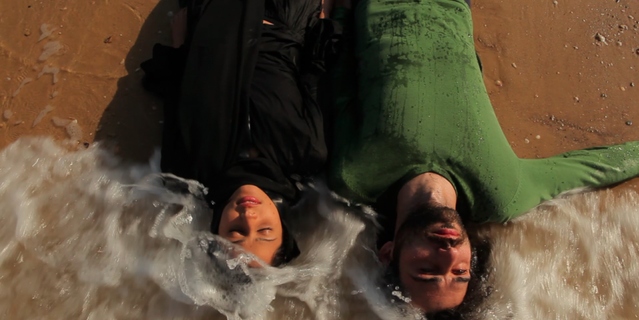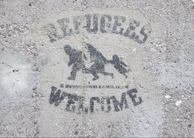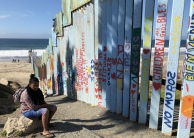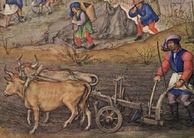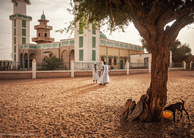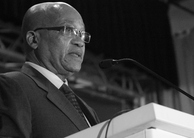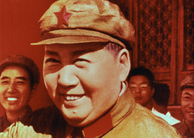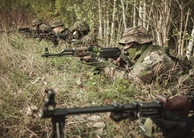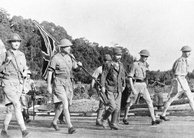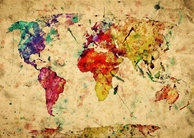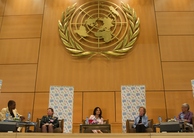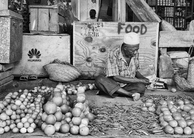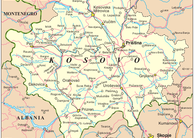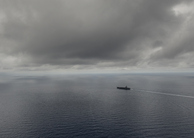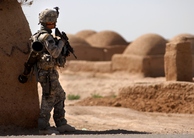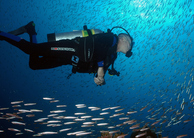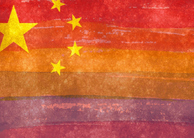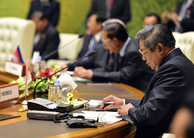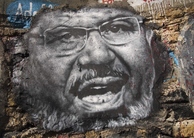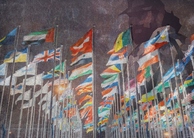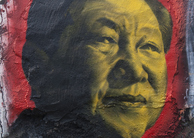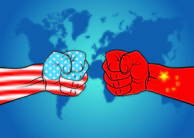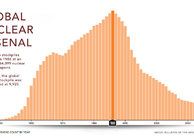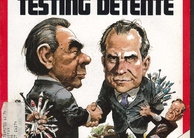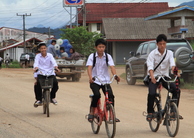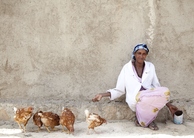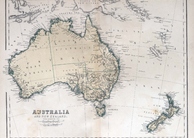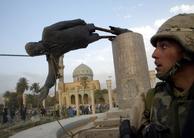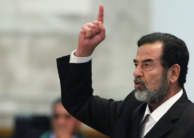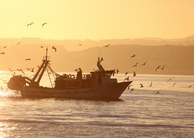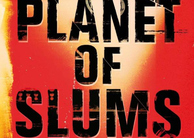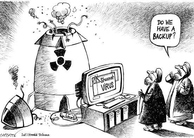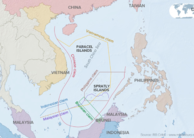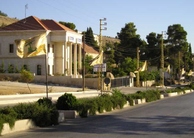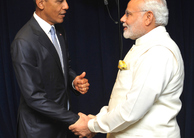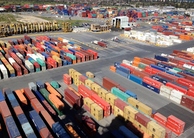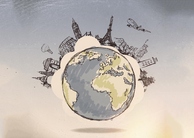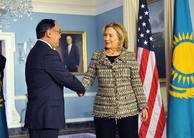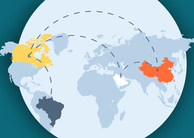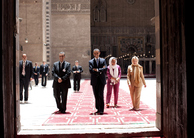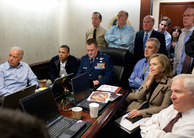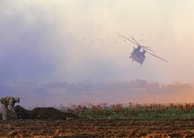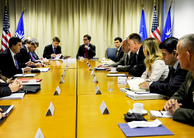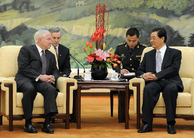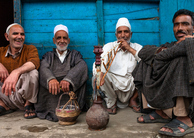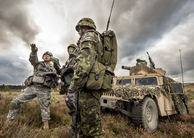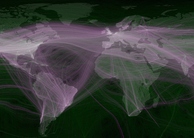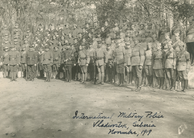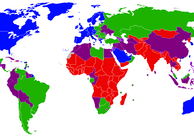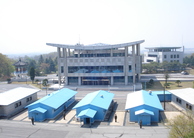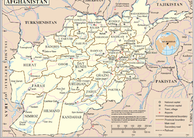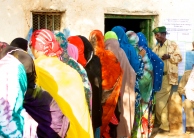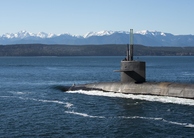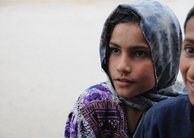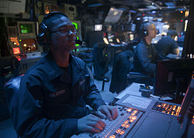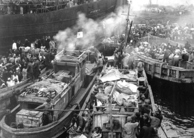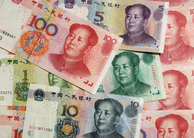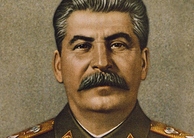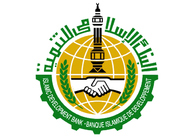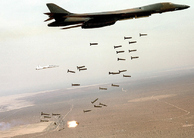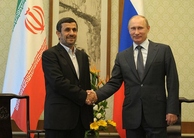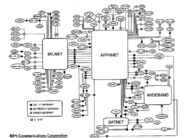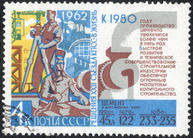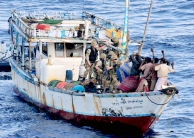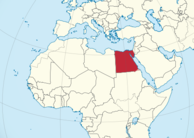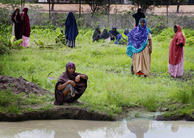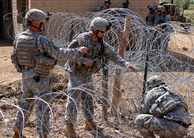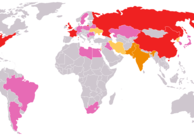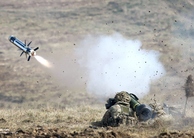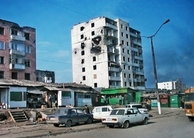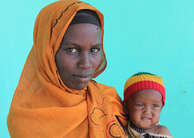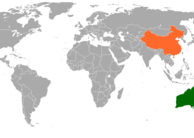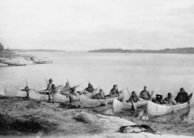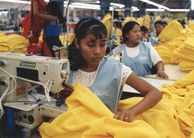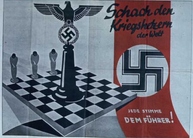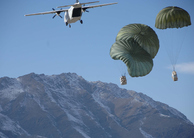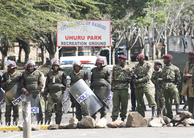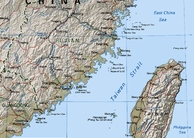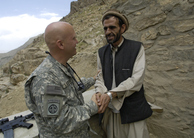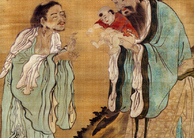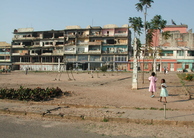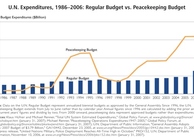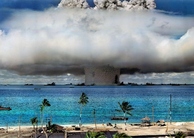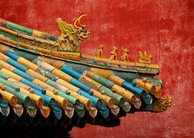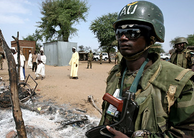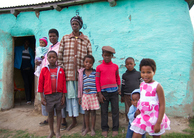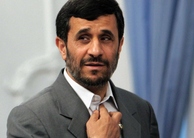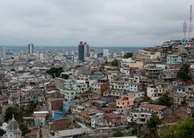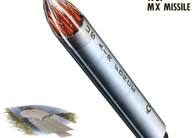|
Nation (tagged articles)
The keyword Nation is tagged in the following 266 articles.
2022, Vol. 14 No. 09
In adapting the twelfth-century story Layla and Majnun, Susan Youssef’s 2011 film Habibi Rasak Kharban re-imagines the Arabic folk tale in the context of Israeli occupation of Palestine, wherein the significance of journeys arises... Read Article »
2022, Vol. 14 No. 04
With over 10 million stateless people globally, statelessness has increasingly become a pressing issue in inter National law. The production of statelessness occurs across multiple lines including technical loopholes, state succession, and discriminatory... Read Article »
2022, Vol. 14 No. 03
This paper explores the complexity of Whitman’s Nationalism and, with reference to Leaves of Grass (1856), examines the apparent paradox between Whitman’s poetry of love and recognition and his imperialistic impulses. This paper draws... Read Article »
2022, Vol. 14 No. 02
In popular inter National relations (IR) theory, knowledge production is often dismissed as an objective process between the researcher and the empirical world. This article rejects this notion and contends that the process of knowledge production... Read Article »
2022, Vol. 14 No. 01
This article explores the political relationship between Nation-building, ethnicity, and democracy in the context of Ethiopia. It traces Ethiopia's poltical history, explores the consequential role ethnicity has played in the formation of the modern... Read Article »
2022, Vol. 14 No. 01
The study examines the degree to which Xi Jinping has brought about a strategic shift to the Chinese outward investment pattern and how this may present significant political leverage and military advantages for China in the Indian Ocean Region (... Read Article »
2021, Vol. 13 No. 12
This paper discusses the structural violence experienced by lesbian, gay, bisexual, trans, intersex, or queer (LGBTIQ+) people and people with disabilities (PWD), and reviews the inter National human rights protections available to each group through... Read Article »
2021, Vol. 13 No. 10
This paper assesses the political preferences and ideologies of the Trump administration and how they influenced framing issues in a way that has underestimated the threats of right-wing militia groups in the United States. President Trump and officials... Read Article »
2021, Vol. 13 No. 09
The COVID-19 crisis has exacerbated current global challenges. However, this article argues that this time of crisis can also be a unique opportunity for the existing global economic institutions - G20, WTO, IMF, and World Bank (WB) - to make the... Read Article »
2021, Vol. 13 No. 04
While the history of ethnography in Russia dates back to the Kievan Rus era, modern ethnographic production in Russia developed in the 17th century and expanded during the late 18th and early 19th centuries as interest in folktales and in the lives... Read Article »
2021, Vol. 13 No. 02
This article explores the way in which Quentin Tarantino’s Inglorious Basterds challenges the myth of the American hero and criticizes the glorification of war cinema by satirizing the viewer directly. The particular focus is on the subtly... Read Article »
2021, Vol. 13 No. 02
During the 2015 refugee crisis Chancellor Angela Merkel allowed refugees to enter Germany in unprecedented numbers. Her historic decision to adapt the so-called “open-door policy” continues to shape contemporary German politics. More... Read Article »
2021, Vol. 13 No. 01
Israel has increased the Nation’s security presence around the Gaza Strip and in the West Bank. Here, the research project analyzes how transaction costs resulting from Israeli security policy impact the output of manufacturing activities... Read Article »
2021, Vol. 13 No. 01
‘Article 15’, released in 2019 is the first mainstream Bollywood film to focus on caste based atrocities. It depicts several uncomfortable truths about our society and has been successful in sparking conversation about caste disparities... Read Article »
2021, Vol. 13 No. 01
Through an exami Nation of recent populist political formulations in Canada, this paper argues that prevailing understandings of right-wing populism are incomplete insofar as they occlude expressions of right-wing populism through regional and economic... Read Article »
2020, Vol. 12 No. 11
This paper investigates the convoluted societal processes to which the individual is exposed from an early age in order to form and acquire their sense of identity, and aims at dismantling these very processes by exhibiting their flimsy and unsubstantiated... Read Article »
2020, Vol. 12 No. 10
Bogs are one of Ireland’s most notable and mysterious landscapes. As explored in the work of Seamus Heaney, the bog’s capacity to preserve memory across generations makes it a melancholic terrain that is uniquely suited to explorations... Read Article »
2020, Vol. 12 No. 10
The emergence of social media platforms into American life has remarkably altered the political communication landscape. Websites such as Twitter have become a prioritized communication medium for politicians looking to directly reach the electorate... Read Article »
2020, Vol. 12 No. 09
Of the thousands of potential cases that could have been investigated by the Inter National Criminal Court (ICC), only 44 individuals have been indicted, with 45 cases currently before the ICC. Further, only 14 out of the 45 have resulted in a complete... Read Article »
2020, Vol. 12 No. 09
The necessity of inter National relief is unending as new crises continue to emerge across the world. Inter National aid plays a crucial role in shaping how affected communities rebuild after a crisis. However, humanitarian aid often results in a... Read Article »
2020, Vol. 12 No. 09
Drawing on Jasbir Puar’s analysis of homo Nationalism in the post-9/11 United States, I investigate the Orientalist and Islamophobic discourses present in liberal and LGBTQ news articles and human rights reports responding to the release of... Read Article »
2020, Vol. 12 No. 02
Between 2012 and 2017, the number of asylum applications from El Salvador, Guatemala, and Honduras—countries collectively known as the Northern Triangle—increased by eight hundred percent[1]. The Trump administration has responded by... Read Article »
2019, Vol. 11 No. 10
This article aims to present the biopiracy of traditional knowledge from India by the United States, which has occurred directly through the use of patent law and indirectly through economic power and cultural imperialism. Throughout this essay,... Read Article »
2019, Vol. 11 No. 02
In recent years, climate change has been increasingly framed as a security issue, with some theorists going so far as to call it the most important security issue of the 21st century. This paper will examine the relationship between climate change... Read Article »
2019, Vol. 11 No. 02
The corpus of Older Scots literature is hyper-attentive to the themes and issues surrounding Nationhood and sovereignty. Authors of the fifteenth and sixteenth centuries often espoused and exploited the National pride of the Scottish people, producing... Read Article »
2019, Vol. 11 No. 01
Globalization is generally studied as a process that extensively impacts Nations and peoples across every aspect of society. Empirical and theoretical research largely focuses on this effect, seeking to discover the impact of an increasingly globalized... Read Article »
2018, Vol. 10 No. 10
After joining the European Union (EU) and the North Atlantic Treaty Organization (NATO) in 2004, Estonians felt secure and in charge of their future. However, following the 2007 Bronze Horseman incident in the Estonian capital of Tallinn which included... Read Article »
2018, Vol. 10 No. 10
The following paper seeks to elucidate the complex processes involved in the Mexican State’s loss of authority and the subsequent acquisition of this authority by armed criminal groups operating in that country. In theoretical terms, this... Read Article »
2017, Vol. 9 No. 12
The relationship between realism and Nationalism is not clearly articulated in inter National relations literature. On one hand, realism and Nationalism are viewed as contradictory forces, standing against one another as reason to emotion, reality... Read Article »
2017, Vol. 11 No. 1
By using an incentives/disincentives model to map the divergent behaviors of multi National corporations (MNCs) confronted by a sanctioned economy, I explain why some economic sanctions work better than others at achieving their desired political... Read Article »
2017, Vol. 9 No. 11
This article uses two decision-making theories – rational choice theory and prospect theory – to examine China’s resolution to intervene militarily in the Korean War. I argue that Chairman Mao Zedong was in a domain of loss both... Read Article »
2017, Vol. 9 No. 11
This research project focuses on invasive aquatic species and their potential usage as biological weapons. It’s a cross disciplinary study which utilises a comprehensive literature review on invasive aquatic species, biological warfare, maritime... Read Article »
2017, Vol. 9 No. 10
The United States government started exploring the soft power potential of student and scholar exchange programs as early as 1908, with the establishment of the Boxer Indemnity Scholarship Program.[1] The father of the theory of soft power, Joseph... Read Article »
2017, Vol. 9 No. 06
Basque Nationalism is a movement that has encompassed myth, mystery, violence, and compromise, all of which have found their justification from the unique language, Euskera. The source of Euskera is uncertain due to its non-Indo-European origin,... Read Article »
2017, Vol. 9 No. 06
Similarly to many European countries, the Swedish population often perceive their history as an epoch of homogeneity: a time when every Swedish citizen was believed to have had the same ethnic phenotype, spoken the same language, believed in the... Read Article »
2017, Vol. 10 No. 2
It is often thought that great military strategists do not engage in simple, frontal assaults, but instead devise complex plans meant to deceive, manipulate, and surprise their enemies. However, do such strategies always lead to victory? If not,... Read Article »
2017, Vol. 9 No. 05
This article explores the role that the Responsibility to Protect (R2P) played in the 2011 intervention in Libya. It examines the R2P legal framework in coordi Nation with events on the ground in Libya during the early part of 2011 in order to thoroughly... Read Article »
2017, Vol. 7 No. 2
This paper examines the reasons behind people's different views of defining what "patriotism" is. Three multivariate linear regressions were performed to determine the causes behind an individual's level of patriotism. Two of the regression models... Read Article »
2017, Vol. 9 No. 04
This piece examines the ideologies and tactics used by fascist governments to validate and enforce their authority through Michael Mann’s work Fascists. By explicating Kant’s view of autonomy and progress, found in “An Answer to... Read Article »
2017, Vol. 9 No. 04
Since the end of the Second World War, scholars of British military history have busied themselves with attempts to explain the British defeat at Singapore to Japan in February 1942. Research reveals that there existed what Peden has called an &... Read Article »
2017, Vol. 9 No. 03
In the year 1648, two treaties signed in the cities of Osnabruck and Munster, collectively known as the Treaty of Westphalia, brought into creation a notion of statehood that would go on to shape and influence the formation of Nation states across... Read Article »
2017, Vol. 9 No. 02
The Inter National Criminal Tribunals for the Former Yugoslavia and Inter National Criminal Tribunals for Rwanda, for the first time in inter National law, recognized sexual violence in conflict as crimes against humanity and grave breaches of inter National... Read Article »
2017, Vol. 9 No. 02
The necessity to grow crops faster and more efficiently has long been a goal for the agriculture industry. Now, through the development of GMOs, this goal is being achieved. However, many critics doubt the reputation of GMOs, instead arguing that... Read Article »
2017, Vol. 9 No. 02
Following the failure of Structural Adjustment Programmes (SAPs) in the 1980s, and the liberal triumphalism caused by the end of the Cold War, development discourse underwent a significant transformation. Key to the new development paradigm was... Read Article »
2017, Vol. 9 No. 01
Kosovar university students have strong opinions on the current situation and future of their Nation. Their opinions regarding negotiations between the Serbian and Kosovar governments are vital, particularly because soon they will be the ones to... Read Article »
2016, Vol. 7 No. 1
Foreign policymakers, academics, and regional pundits have all acknowledged the importance of the South China Sea. This region, rich in resources and trade, is the subject of intense territorial contest and is perpetually at risk for escalation... Read Article »
2016, Vol. 7 No. 1
The consensus in scholarly circles regarding democratic consolidation stipulates the importance of a cohesive demos, or population, that is also congruent with a representative polity, or political class. One of the main inhibitors of this goal... Read Article »
2016, Vol. 7 No. 1
The rise of modernized and efficient militaries competing for dominance against the United States' military has resulted in increased eruptions of conflict globally. A majority of decisions by the Joint Chiefs and EUCOM about long-term U.S. military... Read Article »
2016, Vol. 8 No. 12
President Richard Nixon signed the Marine Protection, Research, and Sanctuaries Act (MPRSA) in 1972 to both promote research in underwater ecosystems as well as nominate National marine protected areas (MPAs) as ‘ National Marine Sanctuaries... Read Article »
2016, Vol. 8 No. 12
Ever since its elimi Nation from the list of mental illnesses in 2001, and decriminalization in 1997, homosexuality in China continues to be at the forefront of China’s growing human rights debate. The estimated 40 million lesbian, gay, bisexual... Read Article »
2016, Vol. 10 No. 1
Economic regionalism has been an observable phenomenon worldwide. Many countries around the world pursue some degree of economic integration with neighbouring countries, in the hopes of capitalizing on the benefits of such an arrangement. At the... Read Article »
2016, Vol. 10 No. 1
We met Scott and Kerstin on different sides of the Atlantic. I met the former in Philadelphia on my way to a convenience store in the early hours of a busy morning when my work schedule benefited from a short coffee break. Håvard met Kerstin... Read Article »
2016, Vol. 8 No. 11
In the early 1990s, two terrorist organizations, Hamas and the Fatah-led Palestinian Liberation Organization (PLO), were using terrorism to promote their political plight of Palestinian self-determi Nation. Although both organizations vowed to use... Read Article »
2016, Vol. 6 No. 1
In today's globalized world, inter National cooperation and information sharing becomes increasingly important. This paper examines the criteria provided in the United State's Endangered Species Act, the European Union's Habitat Directive, and the... Read Article »
2016, Vol. 8 No. 10
In January of 2011, massive protests emerged against Hosni Mubarak, the autocratic leader of Egypt since 1981. After Mubarak stepped down, there was a period of relative freedom for Egyptians, which unfortunately came crashing down roughly two years... Read Article »
2016, Vol. 8 No. 10
This article contributes to the debate as to whether Cloud Nine by Caryl Churchill and M. Butterfly by David Henry Hwang are ultimately essentialist or anti-essentialist, accentuating or disavowing difference. It argues that both plays are successfully... Read Article »
2016, Vol. 8 No. 10
In the immense field of scholarly work regarding defining Nationhood, a raging debate exists between the conservative view of the Nation and the constructivist view. A clear and definitive change in the conception of the ‘realness’ of... Read Article »
2016, Vol. 8 No. 10
China and the Chinese Communist Party (CCP) that leads it has historically limited itself in regards to projecting power and inserting itself into inter National disputes and affairs. With the exception of its involvement in the Korean War, most... Read Article »
2016, Vol. 8 No. 09
Understanding the term 'terrorist' is a complex and controversial issue within both academic scholarship and mainstream literature. By adopting a post-structuralist approach to the study of 'terrorism,' we are able to dissect the terms and understand... Read Article »
2016, Vol. 8 No. 09
Grameen Bank, translated as "rural bank" in the Bangla language, is a grassroots microcredit organization founded in 1983 by Bangladeshi economist Muhammad Yunus to provide new financial opportunities to the poor. Grameen Bank and Muhammad Yunus... Read Article »
2016, Vol. 8 No. 09
American media generally depicts Nationalism as a negative concept, which is threatening to peace and security. However, in its broadest sense, Nationalism can incorporate two phenomena: “(1) the attitude that the members of a Nation have... Read Article »
2016, Vol. 8 No. 09
This paper is an attempt to navigate through existing theories of universalisation of human rights and existing justifications thereof. It is premised on several cultural and political notions that it takes as starting points, not as truisms, but... Read Article »
2016, Vol. 8 No. 08
Nuclear weapons are the most powerful and destructive weapons held in the aresenals of any modern states. Since the creation of the nuclear bomb, many have feared that a nuclear war could lead to the end of life on earth as we currently know it.... Read Article »
2016, Vol. 2015/2016 No. 3
Détente is generally understood as a relaxation of inter National tension. However, there are many conceptions and characteristics of détente: superpower détente (such as ‘Nixinger's, Leonid Brezhnev's or Mao Zedong/ Zhou... Read Article »
2016, Vol. 8 No. 06
Although education is at the forefront of innumerable research and development initiatives, some countries remain significantly under-researched. While increasing statistics exist on development indicators and education in The Lao PDR (hereafter... Read Article »
2016, Vol. 8 No. 06
Despite being often overlooked within the discipline of Inter National Relations (Lee, 2004: 29; Bambra et al., 2005: 187), the governance of health has become central to inter National politics. As recent spatial, temporal and cognitive transformations... Read Article »
2016, Vol. 8 No. 06
In their search for a new development paradigm, many African governments and inter National organizations have reverted to cooperatives, a distinct business model that manifest a turbulent history ranging from pre-colonial to colonial and post-independence... Read Article »
2016, Vol. 8 No. 06
The occurrence of state failure is an important concern for Australia as it pertains to the security and stability of the broader region (Ezrow & Frantz 2013, pp. 16-17). Rotberg (2003, p. 1) defines state failure as the result of internal violence... Read Article »
2016, Vol. 7 No. 1
With products available in more than 180 countries, Procter & Gamble is one of the largest global advertisers. Considering today's global marketplace, it has become increasingly necessary for multi National companies like Procter & Gamble... Read Article »
2016, Vol. 6 No. 2
The efficacy of efforts by the United States government to influence regime change in foreign Nations has been increasingly called into question. Motivated by these statements of skepticism, the study herein provides a statistical analysis of the... Read Article »
2016, Vol. 6 No. 2
Though somewhat counterintuitive given terrorist organizations' clandestine nature, such organizations do engage in strategic alliances and partnerships with one another. A handful of scholars have grappled with terrorist alliances, but a gap in... Read Article »
2016, Vol. 9 No. 2
Ambassador Paul Bremer of the Coalition Provisional Authority, America's interim government between Saddam's fall and the independent establishment of a new Iraqi government, issued two specific orders during his term which combined to create a... Read Article »
2016, Vol. 9 No. 2
Bataclan. San Bernadino. One need not read any further to understand how radicalization is crucial to counterterrorism and National security. Some states have implemented counter-radicalization strategies to cull terrorism at its root. These tactics... Read Article »
2016, Vol. 3 No. 1
The paper “Does Trade Liberalization Lead to Declining Fish Stock Health? Analyzing the Causality” by Erin K. Glenn has been removed from this volume. The editorial board of The Developing Economist decided to withdraw this article... Read Article »
2015, Vol. 2 No. 1
This paper seeks to address one of the most common critiques of Asian firms doing business in Africa: that low levels of corporate governance and poor managerial practices have undermined anti-corruption efforts throughout the continent. The paper... Read Article »
2015, Vol. 12 No. 1
This is the first line from the Ku Klux Klan's (KKK) "Objects and Character of the Order" (Horn, 1939, p. 38). Although these are not words that most modern Americans would ascribe to the Klan, one will find descriptions that depict the Klan as "... Read Article »
2016, Vol. 8 No. 03
In 2014, the United Nations called for "a truly transformative agenda to follow the Millennium Development Goals." This study applies a critical qualitative discourse and textual analysis to examine the first priority of the agenda—to end... Read Article »
2016, Vol. 8 No. 03
Developing states with large natural resource industries have an incli Nation to become over-reliant on one source of capital, causing other industries to fail, promoting corruption, and stimulating crime. Nigeria is one such case, as their booming... Read Article »
2016, Vol. 8 No. 02
Planet of Slums by Mike Davis (2006) is a startling, terrifying, and honest exposé of the world’s poorest big-city slum dwellers. The book explores the future of an unstable and impoverished urban world, and provides a thematic overview... Read Article »
2016, Vol. 2015/2016 No. 2
Cyber security is a compelling problem for scholars of Inter National Politics. Internet technology is so thoroughly integrated into civil society, commerce, governance, critical infrastructures, intelligence collection and law enforcement that the... Read Article »
2016, Vol. 2015/2016 No. 2
In Cyber War Will Not Take Place1, Thomas Rid develops his argument on the concept of "cyberwar", previously formulated in an article of the same name2 published in January 2012. His chief point is that "cyber war has never happened in the past,... Read Article »
2016, Vol. 2015/2016 No. 2
In June 2012, two years after the initial discovery of the Stuxnet worm,1 an excerpt from David Sanger's then soon to be released book entitled Confront and Conceal was published in the New York Times.2 This piece, purportedly based on the testimony... Read Article »
2016, Vol. 2015/2016 No. 2
Cybersecurity is presented in the growing literature on the subject as an essentially "slippery" object for state security.1 The Internet puts a lot of stress on the conventional conception of state security as the insurance of the state's survival... Read Article »
2016, Vol. 8 No. 01
There is a longstanding territorial dispute raging in the South China Sea between China, the Philippines, Malaysia, Taiwan, Brunei, and Vietnam over several groups of islands called the Spratlys and Parcels. While most of the players involved are... Read Article »
2016, Vol. 8 No. 01
The most commonly cited statistic for the gender wage gap in the United States is that women earn seventy-eight cents to every dollar men earn. A great deal of contention however, surrounds the interpretation of this measure as well as others seeking... Read Article »
2016, Vol. 9 No. 1
From the Ku Klux Klan's lynchings to al Qaeda's World Trade Center attacks, terrorist organizations have historically exploited fear and destruction to achieve their end goals. Attacking both a Nation's government and population, terrorist organizations... Read Article »
2016, Vol. 9 No. 1
Starting with a high profile push through the region in 2011, the Obama Administration has made the "Pivot to Asia" a central part of American foreign policy. Enlisting regional partners who share strategic interests will be critical to ensuring... Read Article »
2015, Vol. 6 No. 1
This paper examines the potential effect of decreasing honeybee population on crop prices by estimating the relationship between honeybee population and the price of almonds over time. As a declining honeybee population becomes an increasingly salient... Read Article »
2015, Vol. 6 No. 1
This paper investigates the relationship between various types of economic freedom and intra-EMU export growth. Export growth is the primary empirical puzzle that this paper seeks to explicate, and is important because the EMU's inception preceded... Read Article »
2015, Vol. 7 No. 11
When speaking to a lay person, the concept of inter National justice may conjure a perception of impartiality rising above National interests and biases. This view lends itself naturally to the concept of cosmopolitan law, which David Held characterized... Read Article »
2015, Vol. 7 No. 11
The traditional mourning and burial rituals common in West Africa played a key role in the recent Ebola epidemic focused in Liberia, Sierra Leone and Guinea. One issue that arose during the height of the outbreak was misunderstanding of burial practices... Read Article »
2015, Vol. 5 No. 1
The production, distribution, and consumption of music are highly inter National transactions. In the past, what made them so was the proliferation of American music throughout the rest of the world. Recently, however, things have begun working in... Read Article »
2015, Vol. 5 No. 1
Supporting participants in intrastate conflict often appears as a relatively cheap, effective strategy to address security concerns by weakening and distracting enemies participating in those conflicts if not by outright eliminating them. Rebels... Read Article »
2015, Vol. 7 No. 05
Language difficulties are cited as the most critical issue facing inter National students today. This study particularly looks into the influence of language difficulties on the wellbeing of inter National students. The study was conducted at a student... Read Article »
2015, Vol. 7 No. 05
Their protest challenged the paradigm of power as it existed at the time, specifically by revealing the limitations of the state's ability to exercise its will even in a situation where the state wielded seemingly absolute authority.[1] Power, as... Read Article »
2015, Vol. 7 No. 04
The simplistic history of modern journalism commonly disseminated in western classrooms describes literary journalism and its manifestations around the world as traceable back to a single Anglo-American tradition — specifically, the American... Read Article »
2015, Vol. 8 No. 2
America’s record of engagement in Central Asia[i] has been extensive during its post-9/11 era of adventurism. Between its vast military infrastructure and its explosive expansion of new commercial and security networks, the US has invested... Read Article »
2015, Vol. 2 No. 1
I test a modified value-added real effective exchange rate based on the construction by Bems and Johnson (2012) for suitability as a replacement for conventionallyconstructed real effective exchange rates for countries with high vertical specialization... Read Article »
2015, Vol. 7 No. 03
The use and effectiveness of capital controls in emerging market economies is important to examine because of the potentially damaging effects that these controls may have on a country’s economic growth and development, especially if the country... Read Article »
2015, Vol. 7 No. 03
Since the inception of the American crime fighting force, law enforcement has struggled to prevent discrimi Nation against minority populations. While “racial profiling” (also known as “racially biased policing”)[1] has been... Read Article »
2015, Vol. 7 No. 03
When one analyzes recent LGBTQ advocacy, with its rhetoric of liberal normativity and visibility, the gay rights movement has chosen inclusion over revolution. Through the intersectionality of dominant forms, namely whiteness, patriarchy, and affluent... Read Article »
2015, Vol. 7 No. 02
For a country approximately the size of New Jersey, Israel certainly garners its share of widespread inter National attention. It is scrutinized, dissected, and more often than not, demonized under the microscope of the global media. In spite of... Read Article »
2015, Vol. 7 No. 02
The Haqqani Network has proven itself to be one of the most deadly, daring and inventive terrorist organizations in modern times. Based in the Pakistani tribal lands of North Waziristan, the network has a deep relationship both with the Pakistani... Read Article »
2015, Vol. 7 No. 02
One often-admired trait of the federal courts is their apolitical nature. Judges that are appointed for lifetime tenure do not face the pressures that come with reelection and trying to please constituents. While this may be true, much of the judiciary... Read Article »
2015, Vol. 11 No. 1
In 2013, developing countries were expected to receive $414 billion in remittances – money sent back home by migrant workers. Remittances have been extolled in academic literature for having a substantial positive impact on development and... Read Article »
2015, Vol. 2014/2015 No. 1
British troops will be winding up their operations in Afghanistan by the end of next year. There may be other specialised things British troops will do thereafter, depending on what happens in Afghanistan from 2015. But sustained ‘combat operations... Read Article »
2015, Vol. 2014/2015 No. 1
Politics is the result of interaction of different groups and communities, aiming to ensure peaceful cohabitation of all actors. Due to this relationship between states, statements and actions by government officials, diplomatic officers or even... Read Article »
2014, Vol. 2014 No. 1
In spite of the long-standing debate among economists on the optimal level of government involvement in economic development, little has been said on an optimal level of involvement by non-governmental "Civil Society" Organizations (CSOs). In particular... Read Article »
2014, Vol. 2014 No. 1
On May 18th, 2000, the United States enacted the African Growth and Opportunity Act (AGOA), dramatically expanding trade between itself and Sub-Saharan Africa over the following decade. Yet whereas previous studies in the literature have often sought... Read Article »
2014, Vol. 6 No. 11
Human rights protection in Europe evolved significantly over the last century, culminating in the creation of the European Court of Human Rights. Unfortunately, the decisions made by the European Court of Human Rights are not binding and do not... Read Article »
2014, Vol. 8 No. 1
This paper analyzes the grey market for cyber materials by evaluating the current nature of transactions within the market. This paper claims that vendors ought to be required to disclose information (to companies) on the vulnerabilities, exploits... Read Article »
2014, Vol. 8 No. 1
The formation and expansion of the U.S. Africa Command (USAFRICOM) signals the increasing strategic importance of Africa to U.S. security interests, especially in light of the 2014 U.S.-Africa Leaders Summit on strategic relations. USAFRICOM is... Read Article »
2014, Vol. 8 No. 1
Legitimate whistleblower or traitor? While the public continues to debate which of these titles most aptly describes former National Security Agency (NSA) employee Edward Snowden, a movie set to start filming in January 2015 attests to the continuing... Read Article »
2014, Vol. 6 No. 10
Is China building a harmonious world? In order to answer this question, it is necessary go beyond simply reviewing the official narrative of the 'harmonious world' policy and instead consider it in relation to China's inter National and domestic... Read Article »
2014, Vol. 6 No. 10
The number of overweight and obese individuals in the United States has steadily increased over the last decade (CDC, 2012). According to the Food Research and Action Center, over two-thirds of adults in the United States are either overweight or... Read Article »
2014, Vol. 6 No. 09
Up until the 19th century, China held a position as a great world power. However, for the last two hundred years the West has dominated the world technologically, economically, and politically. The point at which the West began its relative dominance... Read Article »
2014, Vol. 6 No. 09
The Western concept of wilderness encompasses pristine, untrammeled land viewed as “the last remaining place where civilization…has not fully infected the earth” (Cronon, 1995, p. 69). Indeed, many Americans possess this dualistic... Read Article »
2014, Vol. 6 No. 08
To assert that Kashmir has been at a perennial crossroads is a gross understatement. For the good part of sixty years, Indian, Pakistani, and Kashmiri interests have been tussling over the disputed region. For the most part, though, the South Asian... Read Article »
2014, Vol. 4 No. 2
The North American Treaty Organization (NATO) was founded at the outset of the Cold War and served as a collective defense alliance of states in North America and Western Europe against the Soviet bloc. However, following the end of the Cold War... Read Article »
2014, Vol. 4 No. 2
Prospect theory, a behavioral economic theory first proposed by David Kahneman and Amos Tversky in 1979, has evolved into a seminal theory on risk decision-making applicable in a wide range of fields. Yet in both political science and inter National... Read Article »
2014, Vol. 4 No. 2
This paper investigates factors that contribute to the effectiveness of inter National economic sanctions. A review of existing literature on sanctions reveals that scholars of economic statecraft have largely neglected to consider two variables &... Read Article »
2014, Vol. 6 No. 04
In 1914 Russia was a powerful empire. It constituted a fundamental part of the European balance of power. However, years of bloody and costly war changed the Nation by bringing to boil all the inequities and discontent built up under the Tsarist... Read Article »
2014, Vol. 7 No. 2
Freeman writes that global governance in this period has been characterized by the United States’ inability to form a ‘grand strategy’ as it did in the post-WWII period to cope with the multitude of issues in the world today (2011... Read Article »
2014, Vol. 7 No. 2
The balance of terror created by the presence of weapons of mass destruction (WMDs) on the Korean peninsula has escalated the sense of uncertainty in East Asia, jeopardizing both the region’s security and progress towards political and economic... Read Article »
2014, Vol. 1 No. 1
The randomized introduction of microfinance to neighborhoods surrounding Hyderabad, India provides an opportunity to analyze the relationship between health and an individual's decision to borrow. Employing the Abdul Latif Jameel Poverty Action... Read Article »
2014, Vol. 6 No. 04
After 35 years of war in Afghanistan[1], the year 2014 brings two milestones capable of major impact on the future – for better or worse. Firstly, the presidential elections that took place in early April, so far reported to be relatively... Read Article »
2014, Vol. 6 No. 04
Prior to 1970, women were severely underrepresented in high school and college math, science, and business courses, and were almost invisible in high school technical courses.[1] Even professional schools barred access to women for all programs... Read Article »
2014, Vol. 6 No. 03
The creation of western-style government institutions has been unsuccessful in Somalia. This is a direct result of colonial administrations not laying the proper foundation for western government institutions to achieve legitimacy in a culture of... Read Article »
2014, Vol. 2013/2014 No. 1
There is a widespread belief that as societies and governments become increasingly reliant upon information technology, they in turn are becoming more vulnerable to a whole range of cyber-threats.1 Whether these dangers are capable of generating... Read Article »
2014, Vol. 2013/2014 No. 1
IT is important to note th at the duty to cooperate, despite at times having been called a fundamental principle of inter National law2 has not been adequately defined.3 An expansive interpretation would be 'the duty to reach an agreement', which... Read Article »
2014, Vol. 2013/2014 No. 1
The recent economic crisis roved to be immensely threatening to the economic equilibrium within the European Union (EU). Beginning in the United States, it then proved its "domino effect" by covering the EU, resulting in so-called 'financial stress... Read Article »
2013, Vol. 4 No. 1
With nuclear proliferation a major threat to inter National security, this study examines the factors that led three countries to denuclearize by applying Scott Sagan's three models: security, domestic politics, and norms. Rather than only observing... Read Article »
2013, Vol. 4 No. 1
This study provides an overview of the inter National development field's attention to urbanization. Despite cities being proven the largest hubs of development for the industrializing world, patterns in urban areas often behave much differently... Read Article »
2013, Vol. 4 No. 1
This paper identifies and provides an initial analysis of the problem of mismatched theories in peacebuilding programs. This problem occurs when a project is developed by a group that subscribes to one theory of peacebuilding, but is then executed... Read Article »
2008, Vol. 4 No. 1
This essay will discuss visual perception as well as examine the relationship between art and halluci Nation. The paper is divided into three sections. The first section will explore phenomenological aspects of the Ayahuasca halluci Nations described... Read Article »
2013, Vol. 7 No. 1
South Korea, also known as the Republic of Korea (ROK), is a remarkable country in many ways. It survived the Korean War, supported by American military assistance. It successfully transitioned to democracy after nearly 40 years of authoritarian... Read Article »
2013, Vol. 5 No. 10
'Attack' is a term of central importance in the Law of Armed Conflict, the body of inter National rules and standards that regulate conduct in armed conflict (jus in bello). A 1977 amendment to the Geneva Conventions of 1949, 'Protocol I,' defines... Read Article »
2013, Vol. 5 No. 10
This article highlights the European Commission’s role within the European Union (EU), which has been weakened over time. Through this essay various aspects of the Commission’s power in relation to the structure and procedures of comitology... Read Article »
2013, Vol. 5 No. 10
James Joyce's Ulysses is first and foremost a political novel, a "real Irish Nationalist epic in its most . . . politically figurative form" (Bowen vii). Joyce himself stated that Ulysses "is the epic of two races," Israel and Ireland ("To Carlo... Read Article »
2013, Vol. 5 No. 10
This paper analyzes state refugee policies through the lenses of foreign policy behavior and policy linkage. The case studies compare variations in Chinese state policies towards refugees from North Korea, Myanmar, and Vietnam. Through an additional... Read Article »
2013, Vol. 5 No. 09
The purpose of this experiment is to determine the susceptibility of propionibacterium acnes to photodynamic therapy (PDT). Propionibacterium acnes (P. acnes) is the leading cause of acne vulgaris—a chronic inflammatory skin disorder that... Read Article »
2013, Vol. 5 No. 09
This article aims to investigate the effects of moderators such as culture, power dynamics and political factors on the negotiation behavior and processes displayed in a dyadic, geopolitical negotiation scenario by using a hybrid model of well-established... Read Article »
2013, Vol. 5 No. 09
The quest for economic supremacy has been at the heart of the European integration process since its very inception. Tracing the historical origins of the economic progress agenda, Europe’s ambition to bolster its economy vis-à-vis... Read Article »
2013, Vol. 5 No. 08
This report examines the Chinese economic model, the potential for future Chinese growth, and the implications for Australia. An exami Nation of factors that have contributed to the rise of the modern Chinese economy including demographic factors... Read Article »
2013, Vol. 5 No. 06
“Tonight, we gather to affirm the greatness of our Nation—not because of the height of our skyscrapers, or the power of our military, or the size of our economy. Our pride is based on a very simple premise, summed up in a declaration... Read Article »
2013, Vol. 3 No. 1
Widely known as a tropical tourist desti Nation, the Fiji Islands have been gripped by political turmoil and have had four coups in a span of 20 years. Various factors such as tradition versus modernity, military-civilian relations, failure of constitutionality... Read Article »
2013, Vol. 3 No. 1
While the enslavement of humans has been occurring even before the dawn of written history, today's form of slavery occurs on an unprecedented scale in both scope and reach. This work attempts to understand the most vulnerable sectors of population... Read Article »
2013, Vol. 6 No. 2
Mr. Mahbubani is a Professor of Public Policy and Dean of the Lee Kwan Yew School of Public Policy at the National University of Singapore. He is the former Permanent Secretary at the Foreign Ministry, and later served as Singapore Permanent Representative... Read Article »
2013, Vol. 6 No. 2
After the Partition of India in 1947, the two nascent countries of India and Pakistan each faced the difficult task of Nation-state consolidation; however, Pakistan's problem was exacerbated by the fact that it had been geographically divided even... Read Article »
2013, Vol. 5 No. 04
This paper examines historical and contemporary instances wherein sexual violence, specifically rape, was used as a strategic weapon amid both traditional and tribal conflict, as well as in genocidal operations. It analyzes the cogency of sexual... Read Article »
2013, Vol. 5 No. 03
The Soviet Nationality policy for Central Asia in the early twentieth century was an acceleration of the processes of modernization that the Russian Empire had already begun. However, building socialism in a region where no working class existed... Read Article »
2013, Vol. 5 No. 01
In his poem “The Plain Sense of Things,” Wallace Stevens strikes out in a direction that differs greatly from the established norms and expectations of poetry before the Modernist era. Stevens, at times, moves against traditions such... Read Article »
2012, Vol. 2 No. 1
The subject of European legal integration entered the spotlight of interdisciplinary studies in the mid-1990s and has continued to maintain, if not increase, its prominence in scholarly literature (Mattli and Slaughter, 1998, 177-178). As Egan,... Read Article »
2012, Vol. 2 No. 1
Over the past 20 years, the inter National order has been characterized by the conflict between the United States' desire for isolationism and its desire to maintain hegemony. While the United States has initiated and continued wars in Afghanistan... Read Article »
2012, Vol. 4 No. 12
This study asks the question of why minorities are so overrepresented among the homeless, with a focus on the United States and Europe in a comparative perspective. I combine Charles Tilly’s theoretical model on how to challenge durable inequality... Read Article »
2012, Vol. 4 No. 12
While in many cases it serves as a stabilizing factor in the inter National system, and can even be called a force for good, inter National law cannot be considered “law” when applied to states or state action. To be considered “... Read Article »
2012, Vol. 6 No. 1
Islamic banking and finance have become increasingly widespread over the past two decades, particularly in Muslim-majority countries in the Middle East, North Africa, and Southeast Asia. This paper uses country-level data to examine how growing... Read Article »
2012, Vol. 6 No. 1
While states admit a moral responsibility to take action against states that violate human rights and inter National criminal law, inter National law does not create any legally binding obligations on states to prevent or punish violators of human... Read Article »
2012, Vol. 6 No. 1
Myanmar, sitting on the border between South and Southeast Asia, reflects a historically oppressive state with internal struggle as surrounding countries compete for influence. In 1990, the government promised multi-party elections only to ignore... Read Article »
2012, Vol. 4 No. 11
It has been argued that the global trading system is supposed to promote global efficiency and growth, but a rising chorus of voices is asserting that the global economy operates in a way that is fundamentally unfair and seems to be ‘rigged... Read Article »
2012, Vol. 4 No. 10
Each year around 358,000 women die because of complications during pregnancy or childbirth and many more encounter serious problems (WHO, 2012). The vast majority of these problems occur in low-income countries, where poverty increases sickness... Read Article »
2012, Vol. 4 No. 09
Nepal is a small developing country in South Asia, bordered by China to the north and India to the south, east and west. With a total land area of 56,827 square miles, the country is predominantly mountainous with more than 80% of the total area... Read Article »
2012, Vol. 4 No. 08
Background: Mobile phones (MPs) come in close contact with the body and serve as a ready surface for colonization. The aim of this study was to compare MP colonization by bacterial microorganisms between Health Care Workers (HCWs) and Patients Visitors... Read Article »
2012, Vol. 4 No. 08
The question of whether economic relations have an impact on interstate military conflict has divided scholars and political thinkers since the Enlightenment. Kant claimed that economic interconnectedness among states would contribute to long-term... Read Article »
2012, Vol. 4 No. 08
The relationship between trade and conflicts between countries in South Asia is important to examine because of the rising prominence of this region of the world. Security issues are of utmost concern when considering the damaging effects that armed... Read Article »
2012, Vol. 1 No. 1
In response to a growing acknowledgement of the failure of inter National aid, one school of scholars has identified a lack of aid as the defining crisis in development. From their perspective, aid has failed in driving change not due to inherent... Read Article »
2012, Vol. 4 No. 05
The issue of sovereignty lies at the very heart of inter National aviation because all aviation relations are built upon it. The purpose of this paper is to discuss the spectacular evolution of the concept of sovereignty in the air by adopting a... Read Article »
2012, Vol. 5 No. 2
The rise and entry into force of the 2008 Convention on Cluster Munitions (CCM) that prohibits cluster bombs constitutes a global prohibition regime. I argue that this new prohibition regime and the arising new inter National norm set by the CCM,... Read Article »
2012, Vol. 4 No. 04
Russia and Iran have a long history of being geographic neighbours, rivals, competitors and partners - a history which has coined mutual expectations, stereotypes and interactions. Still present in the Iranian collective memory, Tsarist Russia expanded... Read Article »
2012, Vol. 4 No. 04
Today, we live in the aftermath of the Internet revolution. Humanity has never before been more interconnected or had as much access to the same tools and information. As a driving force behind globalization and modern progress, the Internet enables... Read Article »
2012, Vol. 4 No. 03
The Internet is the world’s great equalizer. As the driving force behind globalization and modern progress, the Internet has enabled us to communicate with others across the world almost instantly and provides a medium for cultural, informational... Read Article »
2012, Vol. 4 No. 02
Climate change negotiations have been on the inter National stage for almost four decades. They have a complex history, and act as a comprehensive example of the many variables, obstacles, environments, and processes that can affect any inter National... Read Article »
2012, Vol. 4 No. 02
The very first air traffic controller was Archie League at Saint Louis Airport in Missouri. His control tower was a wheelbarrow with an umbrella for shade during the summer heat, a notepad and flags. He was instructing the pilot to proceed by raising... Read Article »
2012, Vol. 4 No. 01
Does candidacy to the European Union (EU) increase a Nation’s Trade Openness? A good way to begin examining this question is by asking, what is Trade Openness? Simply put, it is a Nation’s imports plus its exports divided by its GDP ([... Read Article »
2011, Vol. 3 No. 12
The rise of superbrands has many implications for the nature of work, workers, and organizations. This paper explores superbrands and their impact in three ways. First, the dynamics of the superbrand Nike, along with the implications of Nike as... Read Article »
2011, Vol. 3 No. 12
The political history of the Middle East is a complex story wrought with instability, conflict, religious and ethnic cleavages, and artificial imperial and colonial borders. These challenges manifest themselves in varied political systems, norms... Read Article »
2011, Vol. 3 No. 12
Compared to other empires throughout history, the USSR was an exception. The rulers of the Soviet Union viewed empire and imperialism in ideological terms as ‘the highest and final stage of capitalism’.[1] By this Leninist definition... Read Article »
2011, Vol. 3 No. 11
This study used Q-methodology in order to explore the diverse range of meanings and understandings that young males construct in relation to testicular cancer (TC) and testicular self-exami Nation (TSE). Using both conventional and online methods... Read Article »
2011, Vol. 5 No. 1
When should the United States intervene militarily in weak countries? This is a topic of pressing inter National concern because the United States keeps intervening in weak countries. We are currently involved indirectly in Libya and very deeply... Read Article »
2011, Vol. 5 No. 1
In 2001, German President Johannes Rau made a statement that divided Germany. In an interview with a television station, Rau said that although he is “pleased and grateful” to be German, he cannot be “proud” of it–&... Read Article »
2011, Vol. 5 No. 1
In 2001, Goldman Sachs named Brazil one of the four most important emerging economies, with China, Russia and India.1 The BRICs, a term coined by Jim O’Neill, are prophesized to become four of the top six economies in the world by 2050,2 and... Read Article »
2011, Vol. 3 No. 10
Since the early 20th century, the feminist movement has made enormous strides to improve the status of female athletes. Prior to the movement’s achievements, female athletes had to play in much poorer facilities, under different rules, and... Read Article »
2011, Vol. 3 No. 10
This study considers the remote causes of exami Nation malpractice in the Nigerian education system with a view to suggest new ways of combating the problem. Three research hypotheses were formulated to guide the study. Using the multistage stratified... Read Article »
2011, Vol. 3 No. 10
While Samuel Huntington's The Clash of Civilizations presents a compelling argument for the events that happened in the former Yugoslavia, the main argument that was set forth by him using religion as the sole cause of the conflicts in the region... Read Article »
2011, Vol. 3 No. 09
Since the early 1990s, rampant piracy off the coast of Somalia has become a major issue for global trade and security, prompting strong responses from the inter National community. In 2010 alone, the collective cost of ransom money, military protection... Read Article »
2011, Vol. 3 No. 09
In the era since the removal of the monarchy in Egypt, a distance seems to have developed between the Egyptian people and the African aspect of their identity. This kind of sentiment has also been corroborated by Egypt’s elite such as Isma... Read Article »
2011, Vol. 2011/2012 No. 1
It was commonplace among academics of the 1970s to share an understanding of the frozen nature of inter National relations during the Cold War period, and to hold similar assumptions about the fixed character of the Nation-state and the importance... Read Article »
2011, Vol. 2011/2012 No. 1
Among European states in the aftermath of the Second World War, multilateral cooperation was seen as a long term stabilisation for peace. The European Union (EU), since its establishment in 1957 as the European Coal and Steel Community with six... Read Article »
2011, Vol. 2011/2012 No. 1
The Economic Monetary Union (EMU) is the end point of an ambitious and historic stage of integrated market changes1 that not only challenge the structure and foundation of modern-day liberal capitalism, but also offer – where successful &ndash... Read Article »
2011, Vol. 2011/2012 No. 1
The first decade of the twenty-first century was a period of change for Russia. The crisis of the 1990s was/were overcome and its inter National posture has improved. However, the scope and the stability of the shift are debatable and there is no... Read Article »
2011, Vol. 3 No. 08
Development is closely linked to the idea of progress. Therefore the way in which progress is quantified, whether through economic, social or spiritual values, determines the way in which we conceptualize development (Power 2005). Religious beliefs... Read Article »
2011, Vol. 3 No. 08
Somalia is home to roughly 9 million people, the overwhelming majority of whom are ethnic Somalis (UN Statistics Division 2010). The country has been plagued with conflict and disorder beginning just years after it attained independence. Following... Read Article »
2011, Vol. 3 No. 06
As WWII ended, and the Cold War began, America began to strengthen its National defense against the Soviet Union. Alliances were created resulting in the formation of NATO and the Warsaw Pact. The United States began to create an arsenal of nuclear... Read Article »
2011, Vol. 3 No. 04
This case study asks the following question: given the symbol of the European Union as the ultimate supra National, rights-based, compliance-inducing inter National organization, why have member states France and Italy escaped punishment for their... Read Article »
2011, Vol. 4 No. 2
This essay seeks to elucidate the puzzle of China's policy decision to create a Sovereign Wealth Fund (SWF). Much literature has been put forth on the topic to predict the strategic benefits China may be pursuing through its investments in American... Read Article »
2011, Vol. 4 No. 2
Recently, earthquakes in Haiti, Chile and New Zealand, mudslides in Brazil, a catastrophic oil spill in the Gulf of Mexico, the fallout from the fiscal crisis in Greece, and refugee flows out of Libya have highlighted the continued relevance of... Read Article »
2011, Vol. 4 No. 2
Richard Burt is the former U.S. ambassador to Germany, and recently played a critical leadership role in the ratification of the Strategic Arms Reduction Treaty (START). Burt had previously served as a correspondent for the New York Times, and is... Read Article »
2011, Vol. 3 No. 04
Inter National Humanitarian Law, based on the concepts of jus ad bello, is defined to be the law of war. This means that the laws involved are meant to be active in a situation of an armed conflict or during war. However, just like inter National... Read Article »
2011, Vol. 3 No. 04
The Islamic Republic of Iran today sits at the crossroads of Asia between the Middle East and Central Asia. This inherently places it in very close proximity to over half of the world's known energy reserves both in the form of petroleum and natural... Read Article »
2011, Vol. 3 No. 03
It is widely recognized that state security is no longer contingent upon a balance of power or the threat of conquering states, but global stability is now instead jeopardized by weak or fragile states. Fragile states represent chaos, disorder,... Read Article »
2011, Vol. 3 No. 03
Controversy, in its etymology, expresses a significant change to something deeply rooted. Hence, differing degrees of controversy in response to immigration can be explained in terms of two main factors: 1) countries’ historical experiences... Read Article »
2011, Vol. 3 No. 03
Tribal communities in India mainly consist of forest dwellers who have accumulated a rich knowledge on the uses of various forests and forest products over the centuries. According to Article 342 of the Indian Constitution, the Scheduled Tribes... Read Article »
2011, Vol. 3 No. 02
The Republic of Chechnya in Russia’s North Caucasus region has drawn significant attention for being host to remarkable instability, thriving terrorism, and a staggering display of human rights violations over the past two decades, including... Read Article »
2011, Vol. 3 No. 02
Previous research suggests that culture influences our autobiographical memories. This study sought to determine if the collectivism/individualism dimension of culture influences the process of imagi Nation inflation. Forty college students were... Read Article »
2011, Vol. 2010/2011 No. 1
The territorial claims on the North Pole are the latest contentious grey area amongst world forces – Russia, Canada, the USA, Denmark and Norway. The events could have been the perfect opportunity for a lesson in puppet mastery on the inter National... Read Article »
2011, Vol. 2010/2011 No. 1
In December 2009 the Danish capital, Copenhagen, hosted a convention of approximately 45,000 participants including 120 Heads of State and Heads of Government, for the purpose of formulating an inter National response to the issue of climate change... Read Article »
2011, Vol. 3 No. 01
Dealing with the issue of healthcare is no small challenge for any country, either rich or poor. For Ethipoia, health issues represent a major challenge. Tuberculosis, malaria, mental illnesses, and especially HIV/AIDS are health issues with which... Read Article »
2011, Vol. 3 No. 01
“Human security means protecting vital freedoms. It means protecting people from critical and pervasive threats and situations, building on their strengths and aspirations. It also means creating systems that give people the building blocks... Read Article »
2010, Vol. 2 No. 12
John Howard, then-Prime Minister of Australia, claimed that, ‘I count it as one of the great successes of this country’s foreign relations that we have simultaneously been able to strengthen our long-standing ties with the United States... Read Article »
2010, Vol. 2 No. 11
The term ‘ Nation’ is notoriously hard to define, not only because it has multiple meanings, but because the prevailing definitions change in response to various social and political factors (Ozkirimli 2000). In its most basic form a... Read Article »
2010, Vol. 2 No. 11
Learning to play guitar is painful. For the first months, the coarse steel of the guitar strings shreds the soft skin of the player’s fingertips into a disgusting bloody mess. A reasonable person who does not play guitar would be entirely... Read Article »
2010, Vol. 2 No. 11
Fascism cannot adapt to, and exist under, certain prominent, contemporary conditions. Specifically, it cannot adapt to the strong democracies in which extreme right parties operate, nor to the ideology of radical Islamic groups. This paper begins... Read Article »
2010, Vol. 4 No. 1
Supporters of “green-badgers”—the nickname given to contractors working inside the American intelligence community—argue that after 9/11 the United States needed a more flexible labor pool of intelligence professionals to... Read Article »
2010, Vol. 2 No. 10
Female writers of the Eighteenth Century often focused on the role of the female imagi Nation in novel writing, poetry composition, and as an outlet for temporarily escaping a harsh world. In Maria, or The Wrongs of Woman, Mary Wollstonecraft... Read Article »
2010, Vol. 2 No. 10
The specific purpose of this paper is to discuss some of the factors that would permit an individual to dissociate himself from his true identity, including at a minimum threshold the change in knowledge of some personal events. It is not required... Read Article »
2010, Vol. 2 No. 09
A country of approximately 37 million people, Kenya has struggled to build a health system that can effectively deliver quality health services to its population. Access to health care varies widely throughout the country and is determined on numerous... Read Article »
2010, Vol. 2 No. 09
Postcolonial Kenya has seen a significant amount of development, both politically and economically, since its independence in 1963. Starting with the presidency of Jomo Kenyatta, the Nation prospered -- experiencing economic growth of at least 5... Read Article »
2010, Vol. 2 No. 07
The United States presidency is a complex role, encompassing both domestic and foreign policy responsibilities. As a major world power, the United States has a large role in the realm of foreign policy, and it is the duty of the president to assume... Read Article »
2010, Vol. 2 No. 06
In 2005, during a period of heightened tensions between China and Taiwan and with the United States deeply embroiled in two major wars in Iraq and Afghanistan, the leading authority on East Asian security within the National Security Council nevertheless... Read Article »
2010, Vol. 2 No. 06
"When can we expect a pro-Western, pro-business government in Iran?" asks a US government official in the quasi-fictitious film Syriana. Today, it is highly probable that the same question is still being asked by anxious diplomats the world over... Read Article »
2010, Vol. 2 No. 06
Martin Luther King, Jr. once wrote that “to ignore evil is to become an accomplice to it.”[1] Although this statement was meant towards the civil rights movement, the idea equally applies in other instances, especially in times... Read Article »
2010, Vol. 2 No. 05
To understand an administration, you need to understand the key players. Through analyzing the Bush presidency, it is clear that the agenda was constructed and shaped by more than just one man. The President’s choice for executive cabinet... Read Article »
2010, Vol. 3 No. 2
Colonel William Way is a USAR officer. He received a direct commission in the Army Judge Advocate General's Corps in 1990. Colonel Way earned a BS in Economics from the Wharton School, University of Pennsylvania, in 1983, a JD from Hastings College... Read Article »
2010, Vol. 3 No. 2
Even before his inauguration, President Barack Obama made it clear that he believed torture was morally reprehensible and promised that under his administration the U.S. would no longer practice torture.1 Accordingly, on April 16th, 2009 Mr. Obama... Read Article »
2010, Vol. 3 No. 2
The past sixty years witnessed a global proliferation of inter National courts and tribunals of almost all sizes and purposes. Today, they play important roles in inter National governance by handing down decisions in compelling areas ranging from... Read Article »
2010, Vol. 2 No. 04
Confucianism was one of the dominant political philosophies of Imperial China. Confucianism’s influence declined throughout the 19th century coinciding with the end of the Qing Dynasty in 1911. Some Chinese intellectuals, like Lu Xun, attacked... Read Article »
2010, Vol. 2 No. 04
Angola today is framed by a history of violent conflict that has left the population far behind on all major indicators. Lacking a democratic culture, the country faces two significant challenges: first, the challenge of completing a long-stalled... Read Article »
2010, Vol. 2 No. 03
Bohumil Hrabal was born in 1915, and lived through some of the most tumultuous years of Czech history. Hrabal grew up in the time of the First Republic, when literature moved away from Nationalism to a more aesthetic view. In this frame, Hrabal... Read Article »
2010, Vol. 2 No. 02
In “Amor de lejos: Latino (Im)migration Literatures,” B.V. Olguin writes, “Latino/a (im)migration narratives…often illustrate the traumatic aspects of displacement by focusing in part on how immigration, migration, exile... Read Article »
2010, Vol. 2 No. 02
The level of data collection mandated by the REAL ID Act of 2007 should raise concern for all American citizens who enjoy their privacy, because it mandates unprecedented levels of data collection and an equally unprecedented level of Nationwide... Read Article »
2010, Vol. 2 No. 01
It has become undeniable that illicit weaponry, specifically small arms and light weapons pose an unprecedented global security threat. In fact it may almost be acceptable to say that with the turn of the 21st century, we witness a world which is... Read Article »
2010, Vol. 2 No. 01
Throughout the twentieth-century, nuclear weapons got deadlier; their range and power have both increased, bringing the potential for greater devastation to the globe. To limit the spread of nuclear weapons, the inter National community adopted the... Read Article »
2010, Vol. 2 No. 01
Since 1989, when economist John Williamson first conceived of the economic and policy recommendations known as the Washington Consensus (Williamson, 1989), this Consensus became generally accepted as the most effective model by which developing... Read Article »
2010, Vol. 2 No. 01
In A Midsummer Night’s Dream, Shakespeare plays with the themes of love, art, imagi Nation, and dreaming to forge an overall meaning for his work. His play within a play, found in Act V, expands on his themes and portrays the relationship... Read Article »
2010, Vol. 2 No. 01
Mass media is perhaps the most powerful tool in the world for creating, changing or perpetuating society’s ideas about an issue or group of people. It works both overtly and subconsciously: deciding which issues are important, how to frame... Read Article »
2010, Vol. 2 No. 01
After the wave of liberalization of many African states in the late twentieth-century, the world has seen a rise in the amount of inter National and internal conflicts that have taken thousands of human lives. Ethnic tensions and economic hardships... Read Article »
2010, Vol. 2 No. 01
In 1994 South Africa's regime of apartheid, under which the black majority was suppressed and discriminated against by the white minority, came to an end.1The African National Congress (ANC) won the first free elections in the same year, and the... Read Article »
2010, Vol. 2009/2010 No. 1
An article about Scotland. In an Inter National Politics Journal. This may seem odd, but it could become relevant in the next few years. It is possible that in twenty years that Scottish Politics will be Inter National. Nationalists in Wales and Scotland... Read Article »
2010, Vol. 2009/2010 No. 1
Such was the BBC’s indictment of the Commonwealth after its 1950 Foreign Minister’s conference in Colombo.1 Yet despite the lampoons in its infancy, the Commonwealth of Nations has, in 2009, reached its 60th Anniversary, having increased... Read Article »
2010, Vol. 2009/2010 No. 1
From Heraclitus to Marx, intellectuals have often recognised changes in the flow of history. Certain periods tend to be more dynamic than others but, in the end, all things move. Just as the past ninety years have been some of the most memorable... Read Article »
2009, Vol. 1 No. 12
Nationalism is defined by Merriam-Webster’s dictionary as, “loyalty and devotion to a Nation; especially: a sense of National consciousness exalting one Nation above all others and placing primary emphasis on promotion of its culture... Read Article »
2009, Vol. 1 No. 11
The simultaneous allure and repulsion of Mexican machismo belies its ambiguous nature as an identifying characteristic of the Nation itself and as a phenomenon that some claim is unique to Mexico and others say is endemic throughout patriarchal... Read Article »
2009, Vol. 3 No. 1
Over the two decades of post-Soviet history of modern Russia, its foreign policy has gone through several distinct periods and long-term trends. The periodization of the new Russia’s foreign policy includes a “romantic” or &ldquo... Read Article »
2009, Vol. 3 No. 1
The Japanese general election on August 30, 2009 ousted the Liberal Democratic Party (LDP), which had governed almost uninterrupted for 54 years. In its place rose the Democratic Party of Japan (DPJ) and its leading man Yukio Hatoyama. What follows... Read Article »
2009, Vol. 3 No. 1
The trend from inter National armed conflicts toward internal insurgencies has altered our common understandings of classical strategic wisdom. While traditionally under the politics of imperialism, wars were settled with the winning state’... Read Article »
2009, Vol. 1 No. 10
At the time of the incident, I was living … in the bush, hiding from the war. One day, I had gone to the fields to collect some food to eat. As I was cultivating, I heard someone screaming loudly and the next minute armed men appeared in... Read Article »
2009, Vol. 2 No. 2
Is America really in decline as a global superpower? We examine current arguments for America's economic decline and argue that a purely economic analysis is insufficient for evaluating a country's status as a global superpower. Our comprehensive... Read Article »
2009, Vol. 2 No. 2
Ambassador Einaudi spoke at Cornell at the invitation of the Mario Einaudi Center for Inter National Studies to commemorate the 20th anniversary of the Luigi Einaudi Chair in European and Inter National Studies named after his grand-father. The Board... Read Article »
2009, Vol. 2 No. 2
The responsibility of Georgian President Michael Saakashvili for the war with Russia continued to be hotly debated in Georgia, Russia and the world several months after its end.1 Indeed, there are various views about Saakashvili's decision to attack... Read Article »
2009, Vol. 2 No. 2
The issue of whether the recognition of Kosovo as an independent state might serve as a precedent for former autonomous republics of Georgia, South Ossetia and Abkhazia has been often debated. This paper aims at comparing the processes of recognition... Read Article »
2009, Vol. 2 No. 2
Two years ago, my mom handed me the article, "Below a Mountain of Wealth, a River of Waste," from The New York Times, describing Freeport-McMoRan's mining activities in Papua New Guinea. After reading "Below," I knew that the world had to change... Read Article »
2008, Vol. 1 No. 2
In the past weeks, print media and blogs are buzzing with renewed speculation about a possible replacement of the Dollar as the dominant global currency by the Euro. This intensification of the debate was sparked by the rise of the Euro above $1... Read Article »
2008, Vol. 1 No. 2
South Asia is not in itself the primary zone of interest of China. However, China has since long used the region’s dynamics to achieve some of its most important strategic goals. Moreover, since India wishes to establish “its rightful... Read Article »
2008, Vol. 1 No. 2
With mass atrocities ongoing in Darfur and past atrocities yet to be addressed, the question of how to achieve accountability for human rights violations in the context of post-conflict society has never been a more pressing concern. But justice... Read Article »
2008, Vol. 1 No. 2
The United Nations Security Council is the most important organ in the United Nations, charged with determining “the existence of any threat to peace, breach of peace, or act of aggression” and to “maintain or restore inter National... Read Article »
2007, Vol. 1 No. 1
Fifteen years ago, the collapse of the bipolar world overwhelmed the installed world order. The USA became the only superpower standing and leading the world organization. They have now to deal with emerging countries such as China and India. On... Read Article »
2007, Vol. 1 No. 1
Today’s and tomorrow’s worlds are radically different from yesterday’s. Self-evident, yet our thought processes often remain anchored in outdated mindsets. The weight of our success and experience can create “an excess in... Read Article »
2007, Vol. 1 No. 1
In recent years, the turbulent nature of politics in the Middle East has captured the attention of Nations worldwide. Iran, in particular, has garnered more than just alarmed glances due to its aggressive foreign policy against the US, as evident... Read Article »
1999, Vol. 1998/1999 No. 1
It is now fourteen years after Ronald Reagan’s infamous ‘Star Wars’ speech, a speech that forecast American space superiority above all other world powers, based on the Strategic Defence Initiative (SDI). Yet it was this program... Read Article »
1999, Vol. 1998/1999 No. 1
Imagine if your student loan determined every decision you made in your entire life… Imagine if you owed 30 times more than you could ever earn in a lifetime…. Difficult to imagine because if this situation happened in a developed... Read Article »
1999, Vol. 1998/1999 No. 1
On October 16, twenty five years after he took power in the September 1973 coup, Augusto Pinochet was detained in London. This episode had produced a series of conjectures and strange turns amongst political circles. What we have to do with... Read Article »
1999, Vol. 1998/1999 No. 2
It cannot have escaped any layman’s notice that the United Kingdom will very soon cease to mean anything to anybody at all, if it does indeed mean anything to anybody at the moment. Nationalism and devolution have ripped the soft underbelly... Read Article »
1997, Vol. 1996/1997 No. 1
When we commemorated the United Nations’ 50th anniversary last year, we all asked the question – what has the UN achieved and is it a living or a largely moribund organisation, buried by the bureaucracy and corruption which the media... Read Article »
1997, Vol. 1996/1997 No. 2
A mother makes aprons and children’s clothes and sells them in a local market. She needs money to buy materials and thread. A rickshaw driver can increase his earnings with a small motorized rickshaw, but needs the money to buy it. A coffee... Read Article »
1997, Vol. 1996/1997 No. 2
Threats to inter National security may assume many guises all of which deserve thorough analysis. Indeed, as we approach the new millennium, there are a multitude of ‘morbid symptoms’ which threaten to thwart any attempts at achieving... Read Article »
1997, Vol. 1996/1997 No. 2
Nuclear weapons were first used in anger during the Second World War against the Japanese. The Horishima and Nagasaki experience left nobody in any doubt that nuclear weapons were unique. Never before had so much destruction been meted out so... Read Article »
Expedited Article Review
Submit an article and get a decision fast.
If you need a fast decision, INQUIRIES Journal offers expedited processing of your submission for a small fee. Depending on the expedited review option you choose, you can receive a decision in as few as 5-days.
In addition to a shorter review period, the fee supports the journal's continued operation and open-access publishing model. Standard submissions are always free. Submit Now » - Submit an Article to Inquiries Journal -
|

